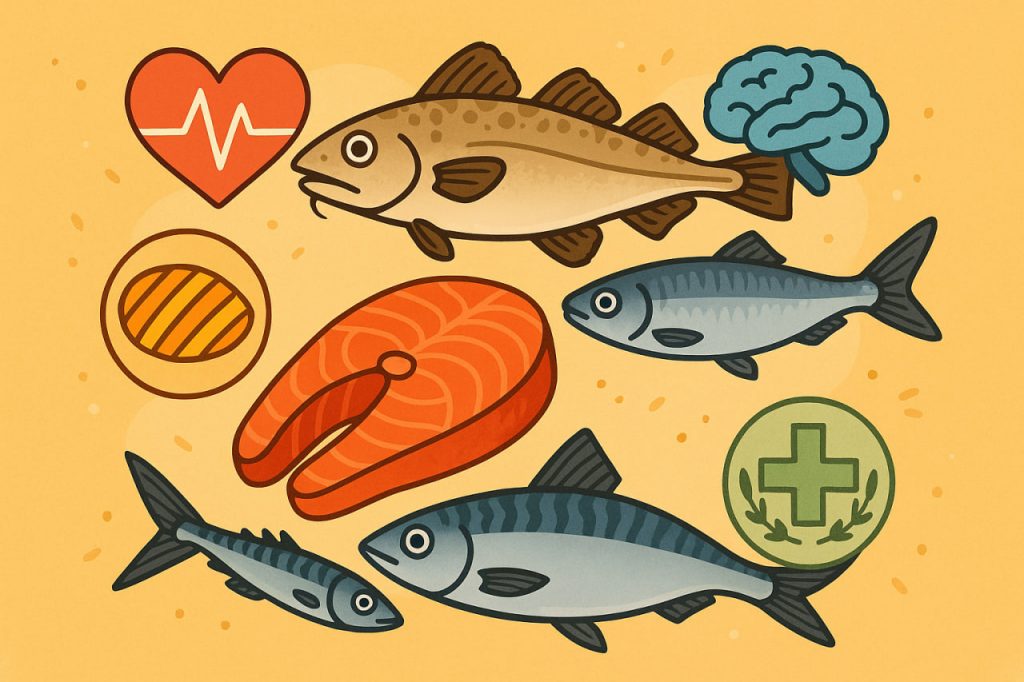Fish have been a vital food source for humans for thousands of years, providing essential nutrients and playing a key role in healthy diets worldwide. With thousands of species found in oceans, rivers, and lakes, fish vary greatly in taste, texture, and nutritional value. Beyond being a rich source of protein, many types of fish are packed with vitamins, minerals, and beneficial fats that support long-term health.
Varieties of Fish
Fish can be broadly divided into two categories: fatty fish and lean fish.
- Fatty fish – such as salmon, mackerel, sardines, and herring, are high in omega-3 fatty acids, which are especially beneficial for heart and brain health.
- Lean fish – such as cod, haddock, and pike, contain less fat but are still excellent sources of protein and minerals.
Additionally, fish can be classified as saltwater (tuna, halibut, anchovies) or freshwater (trout, carp, perch), each with distinct nutritional profiles and culinary uses.
Nutritional Value of Fish
Fish is an excellent source of high-quality protein, which is essential for building muscles and repairing tissues. Fatty fish are rich in omega-3 fatty acids, which reduce inflammation, lower cholesterol, and support brain function. Many species also provide essential vitamins, including vitamin D, vitamin B12, and minerals such as iodine, selenium, and zinc.
Benefits for the Cardiovascular System
Regular fish consumption is strongly linked to better heart health. Omega-3 fatty acids found in fatty fish help lower triglyceride levels, reduce blood pressure, and improve circulation. Populations that consume fish frequently, such as those following the Mediterranean diet, have lower rates of cardiovascular disease.
Support for Brain and Mental Health
Omega-3 fatty acids also play a key role in brain function. Eating fish regularly is associated with improved memory, concentration, and reduced risk of age-related cognitive decline. Some studies also suggest that diets rich in fish may lower the risk of depression and anxiety.
Bone and Immune Health
Fish is one of the few natural food sources of vitamin D, which is crucial for calcium absorption and bone strength. Selenium and zinc found in fish help maintain a strong immune system, while antioxidants protect cells from damage.
Precautions and Sustainability
While fish are highly beneficial, some species contain mercury and other pollutants. Large predatory fish like swordfish and shark should be eaten in moderation, especially by pregnant women and children. Additionally, sustainable fishing practices are essential to protect marine ecosystems and ensure fish availability for future generations.
Conclusion
Fish are a diverse and highly nutritious food, offering essential proteins, healthy fats, and vital vitamins and minerals. Regular consumption supports heart, brain, bone, and immune health, making fish a cornerstone of a balanced diet. Choosing a variety of species and prioritizing sustainably sourced fish allows people to enjoy their benefits while protecting the environment.
Glossary
- Fatty fish – fish high in healthy omega-3 fatty acids, such as salmon and mackerel.
- Lean fish – fish with low fat content, such as cod and haddock.
- Omega-3 fatty acids – essential fats that support heart and brain health.
- Selenium – a mineral important for immunity and antioxidant protection.
- Sustainable fishing – practices that protect marine environments while allowing fish populations to renew.


